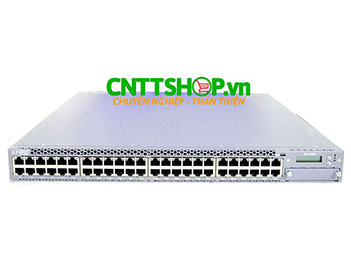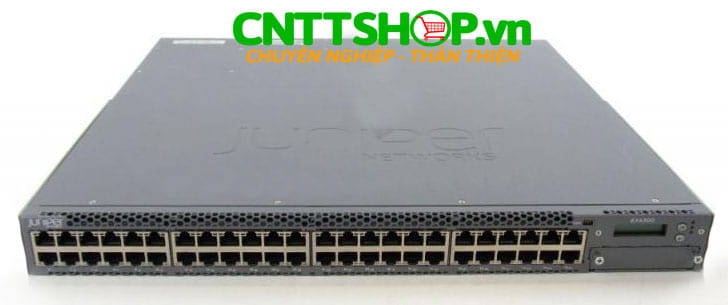| Physical Specifications |
| Backplane |
320 Gbps Virtual Chassis interconnect to combine up to 10 units as a single logical device |
| Uplink Module Options |
4-port dual-mode 10GbE/1GbE module with pluggable SFP+/SFP optics |
| Power Options |
• Power supplies: Autosensing; 100-120 V/200-240 V; AC 350 W AFO, 350 W AFI, 715 W AFO, and 1100 W AFO dual loadsharing hot-swappable internal redundant power supplies
• Maximum current inrush: 50 amps
• Minimum number of PSUs required for fully loaded chassis: 1 per switch |
| Dimensions (W x H x D) |
• 17.41 x 1.72 x 16.43 in. (44.21 x 4.32 x 41.73 cm)
• Desktop installation width noted above, rack-mount width: 17.5 in, (44.5 cm)
• Height: 1 U
|
| System Weight |
• EX4300 switch (with no power supply or fan module): 13 lb (5.9 kg)
• EX4300 switch (with single power supply and two fan modules): 16.1 lb (7.3 kg)
• 350 W AC power supply: 2.4 lb (1.1 kg)
• SFP+ uplink module: 0.44 lb (0.2 kg)
• Fan module: 0.33 lb (0.15 kg) |
| Environmental Ranges |
• Operating temperature: 32° to 113° F (0° to 45° C)
• Storage temperature: -40° to 158° F (-40° to 70° C)
• Operating altitude: up to 10,000 ft (3,049 m)
• Non-operating altitude: up to 16,000 ft (4,877 m)
• Relative humidity operating: 10% to 85% (noncondensing)
• Relative humidity non-operating: 0% to 95% (noncondensing) |
| Cooling |
• Field-replaceable fans: 2
• Airflow: PSU-7.5 cubic feet per minute (CFM); fan-22 CFM
• Total maximum airflow throughput with two power supplies: 59 CFM |
| Hardware Specifications |
| Switching Engine Model |
Store and forward |
| DRAM |
2 GB with ECC |
| Flash |
2 GB |
| CPU |
1.5 GHz Dual-Core PowerPC CPU |
| GbE port density per system |
48 host ports |
| Physical Layer |
• Time domain reflectometry (TDR) for detecting cable breaks and shorts
• Auto medium-dependent interface/medium-dependent interface crossover (MDI/MDIX) support
• Port speed downshift/setting maximum advertised speed on 10/100/1000BASE-T ports
• Digital optical monitoring for optical ports |
| Physical Layer |
• Time Domain Reflectometry (TDR) for detecting cable breaks and shorts: 24P/24T and 48P/48T only
• Auto MDI/MDIX support: 24P/24T and 48P/48T only (all ports)
• Port speed downshift/setting max advertised speed on 10/100/1000BASE-T ports: 24P/24T and 48P/48T only, on all ports
• Digital optical monitoring for optical ports |
| Packet-Switching Capacities (Maximum with 64-Byte Packets) |
496 Gbps |
| Software Specifications |
| Layer 2/Layer 3 Throughput (Mpps) (Maximum with 64 Byte Packets) |
369 Mpps (wire speed) |
| Security |
• MAC limiting (per port and per VLAN)
• Allowed MAC addresses configurable per port
• Dynamic ARP inspection (DAI)
• IP source guard
• Local proxy ARP
• Static ARP support
• DHCP snooping
• Captive portal
• Persistent MAC address configurations
• Distributed denial of service (DDoS) protection (CPU control path flooding protection) |
| Layer 2 Features |
• Maximum MAC addresses per system: 64,000
• Jumbo frames: 9216 Bytes
• Number of VLANs supported: 4093
• Range of possible VLAN IDs: 1 to 4094
• Virtual Spanning Tree (VST) instances: 510
• Port-based VLAN
• Voice VLAN
• Physical port redundancy: Redundant trunk group (RTG)
• Compatible with Per-VLAN Spanning Tree Plus (PVST+)
• Routed VLAN Interface (RVI)
• Uplink Failure Detection (UFD)
• ITU-T G.8032: Ethernet Ring Protection Switching
• IEEE 802.1AB: Link Layer Discovery Protocol (LLDP)
• LLDP-MED with VoIP integration
• Default VLAN and multiple VLAN range support
• MAC learning disable
• Persistent MAC learning (sticky MAC)
• MAC notification
• Private VLANs (PVLANs)
• Explicit congestion notification (ECN)
• Layer 2 protocol tunneling (L2PT)
• IEEE 802.1ak: Multiple VLAN Registration Protocol (MVRP)
• IEEE 802.1p: CoS prioritization
• IEEE 802.1Q: VLAN tagging
• IEEE 802.1X: Port Access Control
• IEEE 802.1ak: Multiple Registration Protocol
• IEEE 802.3: 10BASE-T
• IEEE 802.3u: 100BASE-T
• IEEE 802.3ab: 1000BASE-T
• IEEE 802.3z: 1000BASE-X
• IEEE 802.3ae: 10-Gigabit Ethernet
• IEEE 802.3ba: 40-Gigabit Ethernet
• IEEE 802.3af: Power over Ethernet
• IEEE 802.3at: Power over Ethernet Plus
• IEEE 802.3x: Pause Frames/Flow Control
• IEEE 802.3ah: Ethernet in the First Mile |
| Spanning Tree |
• IEEE 802.1D: Spanning Tree Protocol
• IEEE 802.1s: Multiple instances of Spanning Tree Protocol (MSTP)
• Number of MST instances supported: 64
• Number of VLAN Spanning Tree Protocol (VSTP) instances supported: 510
• IEEE 802.1w: Rapid reconfiguration of Spanning Tree Protocol |
| Link Aggregation |
• IEEE 802.3ad: Link Aggregation Control Protocol
• 802.3ad (LACP) support:
- Number of LAGs supported: 128
- Maximum number of ports per LAG: 16
• LAG load-sharing algorithm bridged or routed (unicast or multicast) traffic:
- IP: S/D IP
- TCP/UDP: S/D IP, S/D Port
- Non-IP: S/D MAC
• Tagged ports support in LAG |
| Layer 3 Features: IPv4 |
• Maximum number of ARP entries: 64,000
• Maximum number of IPv4 unicast routes in hardware: 16,000 prefixes; 32,000 host routes
• Maximum number of IPv4 multicast routes in hardware: 8000 multicast groups; 16,000 multicast routes
• Routing protocols: RIPv1/v2, OSPF, BGP, IS-IS
• Static routing
• Routing policy
• Bidirectional Forwarding Detection (BFD)
• L3 redundancy: Virtual Router Redundancy Protocol (VRRP) |
| Layer 3 Features: IPv6 |
• Maximum number of Neighbor Discovery (ND) entries: 32,000
• Maximum number of IPv6 unicast routes in hardware: 4000 prefixes; 15,000 host routes
• Maximum number of IPv6 multicast routes in hardware: 8000 multicast groups; 16,000 multicast routes
• Routing protocols: RIPng, OSPFv3, IPv6, ISIS
• Static routing |
| Access control lists (ACLs) (Junos OS firewall filters) |
• Port-based ACL (PACL): Ingress and egress
• VLAN-based ACL (VACL): Ingress and egress
• Router-based ACL (RACL): Ingress and egress
• ACL entries (ACE) in hardware per system:
- Port-based ACL (PACL) ingress: 3072
- VLAN-based ACL (VACL) ingress: 3500
- Router-based ACL (RACL) ingress: 7000
- gress shared across PACL and VACL: 512
- Egress across RACL: 1024
- ACL counter for denied packets
• ACL counter for permitted packets
• Ability to add/remove/change ACL entries in middle of list (ACL editing)
• L2-L4 ACL |
| Access Security |
• 802.1X port-based
• 802.1X multiple supplicants
• 802.1X with VLAN assignment
• 802.1X with authentication bypass access (based on host MAC address)
• 802.1X with VoIP VLAN support
• 802.1X dynamic ACL based on RADIUS attributes
• 802.1X Supported Extensible Authentication Protocol (EAP types): Message Digest 5 (MD5), Transport Layer Security (TLS), Tunneled TLS (TTLS), Protected Extensible Authenticated Protocol (PEAP)
• MAC authentication (RADIUS)
• Control plane DoS protection
• Radius functionality over IPv6 for authentication, authorization, and accounting (AAA)
• DHCPv6 snooping
• IPv6 neighbor discovery
• IPv6 source guard
• IPv6 RA guard
• IPv6 Neighbor Discovery Inspection
• Media Access Control security (MACsec)
|
| High Availability |
• Redundant, hot-swappable power supplies
• Redundant, field-replaceable, hot-swappable fans
• Graceful Routing Engine switchover (GRES) for Layer 2 hitless forwarding and Layer 3 protocols on RE failover
• Graceful protocol restart (OSPF, BGP)
• Layer 2 hitless forwarding on RE failover
• Nonstop bridging: LACP, xSTP
• Nonstop routing: PIM, OSPF v2 and v3, RIP v2, RIPnG, BGP, BGPv6, ISIS, IGMP v1, v2, v3
• Online insertion and removal (OIR) uplink module |
| Quality of Service (QoS) |
• L2 QoS
• L3 QoS
• Ingress policing: 1 rate 2 color
• Hardware queues per port: 12
• Scheduling methods (egress): Strict priority (SP), WDRR
• 802.1p, DiffCode (DSCP)/IP precedence trust and marking
• L2-L4 classification criteria: Interface, MAC address, Ethertype, 802.1p, VLAN, IP address, DSCP/IP precedence, TCP/UDP port numbers, and more
• Congestion avoidance capabilities: Tail drop, weighted random early detection (WRED) |
| Multicast |
• IGMP: v1, v2, v3
• IGMP snooping
• Multicast Listener Discovery (MLD) snooping
• PIM-SM, PIM-SSM, PIM-DM |
| Services and Manageability |
• Junos OS CLI
• Web interface
• Out-of-band management: Serial; 10/100/1000BASE-T Ethernet
• ASCII configuration
• Rescue configuration
• Configuration rollback
• Image rollback
• LCD management
• Element management tools: Juniper Networks Network and Security Manager (NSM)
• Remote performance monitoring
• Proactive services support via Advanced Insight Solutions (AIS) • SNMP: v1, v2c, v3
• RMON (RFC 2819) Groups 1, 2, 3, 9
• Network Time Protocol (NTP)
• DHCP server
• DHCP client and DHCP proxy
• DHCP relay and helper
• DHCP local server support
• RADIUS
• Junos Space Service Now for automated fault detection, simplified trouble ticket management, and streamlined operations
• TACACS+
• SSHv2
• Secure copy
• HTTP/HTTPs
• Domain Name System (DNS) resolver
• System logging
• Temperature sensor
• Configuration backup via FTP/secure copy |
|
Safety and Compliance
|
| Safety Certifications |
• UL-UL60950-1 (First Edition)
• C-UL to CAN/CSA 22.2 No. 60950-1 (First Edition)
• TUV/GS to EN 60950-1, Amendment A1-A4, A11
• EN 60950-1 (2006 +A1:2009+A12:2010) Information Technology Equipment—Safety
• IEC 60950-1 (2005 +A1:2009) Information Technology Equipment—Safety |
| Electromagnetic Compatibility Certifications |
• FCC 47CFR Part 15 Class A
• EN 55022 Class A
• ICES-003 Class A
• VCCI Class A
• AS/NZS CISPR 22 Class A
• CISPR 22 Class A
• EN 55024
• EN 300386
• CE |
| NEBS |
GR-1089-Core: EMC and Electrical Safety for Network Telecommunications Equipment |
| Environmental |
Reduction of Hazardous Substances (ROHS) 6/6 |
| Telco |
• CLEI code |
| Acoustic Noise in DBA |
37.8 |
 Switch
Switch Wifi - Access Point
Wifi - Access Point Firewall
Firewall Router
Router Module Quang
Module Quang![Module Quang Cisco]() Module Quang Cisco
Module Quang Cisco![Module quang HPE]() Module quang HPE
Module quang HPE![Module quang Maipu]() Module quang Maipu
Module quang Maipu![Module quang Brocade]() Module quang Brocade
Module quang Brocade![Module quang Fortinet]() Module quang Fortinet
Module quang Fortinet![Module quang Aruba]() Module quang Aruba
Module quang Aruba![Module quang OEM]() Module quang OEM
Module quang OEM![Module quang Juniper]() Module quang Juniper
Module quang Juniper![Module quang Dell]() Module quang Dell
Module quang Dell![Module quang Palo Alto]() Module quang Palo Alto
Module quang Palo Alto![Module quang Huawei]() Module quang Huawei
Module quang Huawei![Module quang Arista]() Module quang Arista
Module quang Arista![Module quang F5]() Module quang F5
Module quang F5![Module quang H3C]() Module quang H3C
Module quang H3C![Module Quang Allied Telesis]() Module Quang Allied Telesis
Module Quang Allied Telesis![Module quang SonicWall]() Module quang SonicWall
Module quang SonicWall![Module quang Mikrotik]() Module quang Mikrotik
Module quang Mikrotik![Module quang Handar]() Module quang Handar
Module quang Handar Máy chủ (Server)
Máy chủ (Server) Thiết bị lưu trữ (SAN, NAS)
Thiết bị lưu trữ (SAN, NAS) Load Balancing
Load Balancing Video Conferencing
Video Conferencing Phụ kiện máy chủ
Phụ kiện máy chủ Thiết Bị IoT
Thiết Bị IoT Phụ Kiện Mạng
Phụ Kiện Mạng




.png)

























Bạn đang cần tư vấn về sản phẩm: EX4300-48T-S ?